My Way Coordination framework - Disability Services Commission
My Way Coordination framework - Disability Services Commission
My Way Coordination framework - Disability Services Commission
Create successful ePaper yourself
Turn your PDF publications into a flip-book with our unique Google optimized e-Paper software.
<strong>My</strong> <strong>Way</strong> <strong>Coordination</strong> <strong>framework</strong><br />
Family, friends, community – a good life
Contents<br />
1. <strong>My</strong> <strong>Way</strong> <strong>Coordination</strong> ......................................................... 3<br />
2. <strong>My</strong> <strong>Way</strong> <strong>Coordination</strong> Framework ....................................... 4<br />
2.1 Vision .......................................................................... 4<br />
2.2 Principles..................................................................... 4<br />
2.3 Objectives ................................................................... 5<br />
2.4 Outcomes .................................................................... 5<br />
3. <strong>My</strong> <strong>Way</strong> approach .............................................................. 6<br />
3.1 Values and Attitudes ................................................... 6<br />
3.2 Relationships ............................................................... 6<br />
3.3 Effectiveness qualities ................................................. 6<br />
4. <strong>My</strong> <strong>Way</strong> Coordinator role ................................................... 7<br />
4.1 Examples to illustrate seven aspects of the <strong>My</strong> <strong>Way</strong><br />
Coordinator role ................................................................. 7<br />
5. Assumptions underpinning the principles of <strong>My</strong> <strong>Way</strong><br />
<strong>Coordination</strong> .................................................................... 11<br />
6. Further information .......................................................... 14<br />
October 2012<br />
2 | Page
1. <strong>My</strong> <strong>Way</strong> <strong>Coordination</strong><br />
The <strong>My</strong> <strong>Way</strong> project builds on the Local Area <strong>Coordination</strong> program which has been<br />
supporting West Australians with a disability and their families and carers since 1988. <strong>My</strong><br />
<strong>Way</strong> is the next step in the <strong>Disability</strong> <strong>Services</strong> <strong>Commission</strong>’s journey towards personalised,<br />
individualised services. This self-directed supports and services project will empower<br />
people with disability, their families and carers to plan in a way that will give them greater<br />
choice and control over the supports and services they wish to access.<br />
<strong>My</strong> <strong>Way</strong> Coordinators (MWCs) assist people with disability to plan, organise and access<br />
supports and services which enhance their participation in and contribution to their local<br />
community.<br />
In addition, MWCs work with family members and others involved in supporting people with<br />
disability so that they are strengthened and supported in their caring role.<br />
MWCs actively support positive partnerships between people with disability, families and<br />
carers, local organisations and the broader community to build a more inclusive community.<br />
<strong>My</strong> <strong>Way</strong> Coordinators are available to people with disability who are eligible for <strong>Commission</strong><br />
provided and funded services and live in one of the four <strong>My</strong> <strong>Way</strong> project locations:<br />
Cockburn/Kwinana, Hills, Goldfields or Lower South West.<br />
Each MWC works with up to 50 people with disability, providing personalised, flexible and<br />
responsive support.<br />
October 2012<br />
3 | Page
2. <strong>My</strong> <strong>Way</strong> <strong>framework</strong><br />
2.1 Vision<br />
People with disability, their families and carers will be able to exercise genuine choice and<br />
control over the supports and services they need to live a good life in their local community.<br />
2.2 Principles<br />
As citizens, people with disability have the same rights and responsibilities as all other<br />
people to participate in and contribute to the life of the community.<br />
People with disability, their families and carers are in the best position to determine their<br />
own needs and goals, and to plan for the future.<br />
Families, friends and personal networks are the foundations of a rich and valued life in<br />
the community.<br />
People with disability, their families and carers have natural authority and are best<br />
placed to be their most powerful and enduring leaders, decision-makers and advocates.<br />
Access to timely and accurate information enables people to make appropriate<br />
decisions and to gain more control over their lives.<br />
Communities are enriched by the inclusion and participation of people with disability,<br />
and these communities are the most important way of providing friendship, support and<br />
a meaningful life to people with disability and their families and carers.<br />
The lives of people with disability, their families and carers are enhanced when they can<br />
determine their preferred supports and services and control the required resources, to the<br />
extent that they desire.<br />
<strong>Services</strong> provided by government and community agencies complement and support the<br />
primary role of families, carers and communities in achieving a good life for people with<br />
disability.<br />
Partnerships between individuals, families and carers, communities, governments,<br />
service providers and the business sector are vital in meeting the needs of people with<br />
disability.<br />
People with disability have a life-long capacity for learning, development and<br />
contribution.<br />
October 2012<br />
4 | Page
2.3 Objectives<br />
The <strong>My</strong> <strong>Way</strong> project has three key objectives for people with disability, their families and<br />
carers:<br />
1) Individualised, Self Directed Supports and <strong>Services</strong> (SDSS): Increased choice<br />
and control for people with disability, their families and carers over their supports and<br />
services to ensure their identified needs are met.<br />
2) Good Life Planning: Increased engagement in planning with people with disability,<br />
their families and carers with a focus on a good life rather than funding.<br />
3) Stronger connections with community and generic services: Enhanced<br />
community belonging for people with disabilities in their local area.<br />
2.4 Outcomes<br />
The <strong>My</strong> <strong>Way</strong> project seeks to achieve outcomes by changing the process by which<br />
planning, service provision and funding occurs. These improved processes are expected to<br />
lead to the following outcomes:<br />
1) People with disability, their families and carers will have an enhanced sense of<br />
control over their lives<br />
2) People with disability, their families and carers will be satisfied with the range and<br />
quality of services they receive<br />
3) Individual plans are developed and achieved<br />
4) Individual outcomes are achieved in the most cost effective way possible and lead to<br />
the achievement of the <strong>Commission</strong>’s overarching performance higher level<br />
outcomes.<br />
October 2012<br />
5 | Page
3. <strong>My</strong> <strong>Way</strong> approach<br />
People with disability and their families throughout the state have valued the approach of<br />
Local Area <strong>Coordination</strong>. <strong>My</strong> <strong>Way</strong> Coordinators will continue to use this approach which is<br />
characterised by the following qualities:<br />
3.1 Values and attitudes<br />
committed to the <strong>Commission</strong> vision and based on clear principles<br />
not ‘values-free’<br />
committed to community<br />
committed to valued social roles for people with disabilities<br />
recognises diversity and individuality.<br />
3.2 Relationships<br />
listens / actively listens / ability to listen<br />
not an ‘authority’, not always having an answer<br />
non-judgemental; non-discriminatory<br />
builds trusting relationships and shared partnerships<br />
humility and willingness to learn<br />
approachable, positive, passionate, open, friendly and respectful<br />
someone to talk to but not ‘best friend’<br />
respectful of confidentiality<br />
ability to adapt their relationships to suit different families<br />
‘in tune’ with families; ability to build rapport<br />
committed to long-term relationships.<br />
3.3 Effectiveness qualities<br />
creative and flexible<br />
well-informed, knowledgeable and has an understanding of the ‘big picture’<br />
a ‘can do’ approach<br />
focuses on ability rather than deficits<br />
provides accurate and timely information<br />
ability to explore goals and dreams<br />
ability to network and link people together<br />
ability to assist people to plan for a good life<br />
supports the empowerment of families and individuals<br />
strong understanding and skills in advocacy<br />
stable, personal, consistent<br />
strong local connections<br />
meets with people in their homes and community<br />
being ‘the bridge’/‘the link’<br />
work from ‘where people are at’.<br />
October 2012<br />
6 | Page
4. <strong>My</strong> <strong>Way</strong> Coordinator role<br />
<strong>My</strong> <strong>Way</strong> Coordinators provide ongoing support to people with disability, their families<br />
and carers to help them access information, plan for the future, participate in their<br />
community and navigate the disability support system. The <strong>My</strong> <strong>Way</strong> Coordinator role<br />
includes, but is not limited to, the following:<br />
1. Builds and maintains effective working relationships with individuals,<br />
families/carers and communities in the local area.<br />
2. Provides accurate and timely information. Assists individuals, families/carers and<br />
communities to access information through a variety of means.<br />
3. Engages with individuals and families/carers to identify their goals, strengths and needs,<br />
and plan for the future.<br />
4. Supports individuals, families and carers to gain the skills, confidence and expertise<br />
required to plan for the future.<br />
5. Facilitates and supports the development, maintenance and review of plans.<br />
6. Supports individuals and families/carers to utilise personal and local community<br />
networks to develop practical solutions to meet their goals and needs.<br />
7. Assists individuals and families/carers to access the supports and services they need to<br />
pursue their identified goals and needs, including access to funding as appropriate.<br />
4.1 Examples to illustrate seven aspects of the <strong>My</strong> <strong>Way</strong> Coordinator<br />
role<br />
The following examples of typical, every-day activities have been developed to illustrate some<br />
of the important aspects of the MWC role. They are examples of how the MWC can engage<br />
with and support people with disability, families, carers and their communities. They are<br />
snapshots or insights into the work of the MWC without being a prescriptive list of activities<br />
that will apply in all situations. It should be noted that these examples are not an exhaustive<br />
list of all MWC activity.<br />
1. Builds and maintains effective working relationships with individuals,<br />
families and their communities in a local area.<br />
The MWC regularly visits a family home to discuss issues of importance to the person<br />
with disability and their family/carers.<br />
The MWC spends time at the local community centre meeting with local people and<br />
groups to facilitate the inclusion of a young man with disability into a youth forum to be<br />
October 2012<br />
7 | Page
held in the local community.<br />
The MWC provides the <strong>Disability</strong> <strong>Services</strong> <strong>Commission</strong> with information about trends<br />
and issues of importance for people with disability living in their local area.<br />
2. Provides accurate and timely information. Assists individuals,<br />
families/carers and communities to access information through a variety of<br />
means.<br />
The MWC arranges for an experienced interpreter to explain guardianship issues to the<br />
elders of a remote Aboriginal community assisting a family and the elders to make<br />
decisions about a guardianship application for a young man with a cognitive impairment.<br />
Following a family’s move to an area, contact is made with a MWC. Over a period of<br />
time the MWC links the family to various means of accessing information such as<br />
websites, mailing addresses, and the local parent network.<br />
During the first few meetings with the parents of a child with disability, the MWC<br />
provides information about <strong>Commission</strong> programs and services as well as information<br />
about other relevant supports and services available in the local area.<br />
3. Engages with individuals and families/carers to identify their goals, strengths<br />
and needs, and plan for the future.<br />
The MWC is contacted by the family that has recently moved to the area. Their 14 year<br />
old son is very keen on soccer, is a talented mathematician and also has Autism. The<br />
MWC assists the family to explore the educational and recreational opportunities<br />
available in the local area that will allow the young man to develop his skills and<br />
networks. Through the MWC’s local connections the young man is given the opportunity<br />
to assist the local soccer club with post-game statistical analysis each weekend.<br />
A MWC has been actively involved in a local youth coordinating committee and has<br />
established some good connections with local churches. The MWC brings together a<br />
young woman with a disability who is a talented guitarist, a youth worker and a local<br />
church member to establish an inclusive music workshop program. The group apply for<br />
and are granted funding which enables the young woman to be employed to teach<br />
guitar to other young people in the group.<br />
A child with multiple disabilities travels from a small country town to Perth on a regular<br />
basis to attend specialist medical appointments. The child’s parents have had difficulty<br />
in getting the medical facilities to co-ordinate appointments to minimise the time spent in<br />
Perth. The MWC successfully advocates on behalf of the family to ensure that future<br />
visits are planned and coordinated.<br />
October 2012<br />
8 | Page
4. Supports individuals, families and carers to gain the skills, confidence and<br />
expertise required to plan for the future.<br />
A MWC links the parents of a man with a severe intellectual disability living in a country<br />
town with a small voluntary organisation that provides practical assistance in the use of<br />
planning techniques. This assists the family to plan effectively to meet the goals and<br />
needs of the man in the future.<br />
A MWC is a member of the local government access committee and has highlighted a<br />
range of issues that restrict the mobility and community participation of people with<br />
disability. He has included a young woman with a physical disability who is keen to<br />
contribute and take on a leadership role in the local community.in these meetings and<br />
will soon vacate the position to be replaced by her.<br />
The MWC assists a person with a physical disability who is having problems gaining<br />
required services from a local home and community care agency. The MWC provides<br />
information about the particular agency, including services available and the eligibility<br />
criteria, and assists the person to explore how best to approach the agency. The MWC<br />
then attends the meetings alongside the person and offers assistance where necessary.<br />
5. Facilitates and supports the development, maintenance and review of plans.<br />
A young man with a disability talks about one day living in his own home. The young<br />
man, his parents and the MWC develop a list of people to invite to an informal planning<br />
discussion at the family home over a barbeque. They will be asked to identify<br />
opportunities in the local area that will strengthen the young man’s networks and to<br />
suggest short and long-term strategies which will assist the young man to develop the<br />
skills he will need to live independently.<br />
The MWC assists a parent to plan for the transition of their young daughter into the<br />
school system. Through a series of home visits over six months and one important visit<br />
to the local school the MWC assists with the preparation of an action plan to deal with all<br />
the issues associated with starting school. Two weeks into the new term the MWC and<br />
parent touch base to talk about how it is working out and then meet to review the plan<br />
after a further three months. Some changes are made to the supports around after<br />
school activities and a new plan for the next 12 months is developed.<br />
The parents of a 57 year old man who has worked five days a week in a local business<br />
for many years request assistance from the MWC. The man is wishing to reduce his<br />
work commitments but his elderly parents are struggling to cope with him being at home<br />
more. The MWC works with the man and his family to develop a plan that will support<br />
him to explore activities and opportunities in the local community that he may wish to<br />
pursue as he moves towards retirement. The MWC also engages in conversations with<br />
the family about the options they have in mind for the man when his parents are no<br />
longer able to care for him.<br />
October 2012<br />
9 | Page
6. Supports individuals and families/carers to utilise personal and local community<br />
networks to develop practical solutions to meet their goals and needs.<br />
The MWC uses her knowledge of the local community to link the parent of a child with<br />
high support needs with another family in the local area. Through this connection<br />
arrangements are made for the child with the disability to be taken to school each day in<br />
the family vehicle rather than having to use specialised transport which has proven to be<br />
problematic.<br />
A mature woman with an intellectual disability who lives on her own has recently moved<br />
into the area and become socially isolated. The MWC gets to know her and finds out<br />
she is interested in crafts and attending church. Consequently, the MWC introduces her<br />
to a local church and craft group and she makes new friends who visit her and are able<br />
to provide her with support when needed. She also finds a valuable role in the church.<br />
A MWC assists the parents of a child with disability to explore ways that they might<br />
enlist the support of immediate and extended family to more effectively help out during<br />
the times when Dad is out of town with his fly-in fly-out employment roster.<br />
7. Assists individuals and families/carers to access the supports and services<br />
they need to pursue their identified goals and needs, including access to<br />
funding as appropriate.<br />
The family of a young woman with a disability have recently moved into a new area. The<br />
MWC provides information about the local services and the young woman is assisted to<br />
connect with the local educational organisations to pursue her chosen path of study.<br />
She is also given information to assist her in making her own decisions about transport.<br />
Following an extended period of discussion and planning, a MWC assists the ageing<br />
parents of a young man with severe and multiple disabilities to apply for funding. Such<br />
funding will be used to purchase personal care supports that will enable him to continue<br />
to live in the family home safely.<br />
A woman living in the local area develops an illness which results in permanent<br />
impairments to her speech and mobility. She wishes to remain living in her family home<br />
and requests assistance in accessing daily support with showering. She would also like<br />
several items of equipment (which are beyond the family’s capacity to self-fund) in order<br />
to maintain a level of dignity and independence. The MWC assists the woman and her<br />
family to develop a plan which includes liaison with the local Allied Health team and<br />
Rotary Club to assist with a portion of the funding required for the equipment. The MWC<br />
also assists the woman to submit the plan to the local funding allocation process with a<br />
request for funding of the balance and personal support required.<br />
October 2012<br />
10 | Page
5. Assumptions underpinning the principles of <strong>My</strong> <strong>Way</strong><br />
<strong>Coordination</strong><br />
1. As citizens, people with disability have the same rights and responsibilities<br />
as all other people to participate in and contribute to the life of the<br />
community.<br />
All people have a contribution to make to society.<br />
All people should have opportunities to make a contribution to society.<br />
All people should have the opportunity to take risks in their quest to lead good lives.<br />
<strong>Disability</strong> should not be a barrier to citizenship.<br />
All people should be given the opportunity to participate in, and contribute to, the<br />
‘building blocks’ of life: education, training, employment, leisure, community life.<br />
Community connectedness is essential for a good life.<br />
Segregation, isolation, marginalisation and ‘congregation on the basis of disability’ are<br />
damaging to all people.<br />
Community participation provides opportunities for people to make valued contributions.<br />
For all members of society, rights come with responsibilities.<br />
2. People with disability and their families are in the best position to determine<br />
their own needs and goals and to plan for the future.<br />
Families are the most important and enduring support for a person with disability.<br />
Families generally want what is best for each family member.<br />
Brothers and sisters can be in a position to support other siblings.<br />
When resources and supports are chosen and controlled by the person with disability<br />
and/or their family, they are more likely to fit in well with family life.<br />
All people have a desire to pursue dreams and develop trusting relationships.<br />
All people need other people.<br />
3. Families, friends and personal networks are the foundations of a rich and<br />
valued life in the community.<br />
Active involvement in family life adds richness to the lives of individuals.<br />
Friendships are the bridge between individuals and community.<br />
Involvement in friendships, groups and community life enables people to develop valued<br />
roles in society.<br />
Families can gather information and learn from other families.<br />
Families give on-going commitment, support, security, love, belonging and a values<br />
base.<br />
October 2012<br />
11 | Page
4. People with disability and their families have natural authority and are best<br />
placed to be their most powerful and enduring leaders, decision-makers and<br />
advocates.<br />
People with disability and their families have a legitimate authority for advocacy and<br />
leadership that stems from their direct involvement in the issues associated with<br />
disability.<br />
Leadership, decision-making and advocacy are most effective when they are based on<br />
natural (legitimate) authority.<br />
5. Access to timely and accurate information enables people to make<br />
appropriate decisions and to gain more control over their lives.<br />
Information is a powerful tool for decision-making.<br />
Accurate and timely information is essential for good decision-making.<br />
All people gain greater control of their lives when they have real choices and can make<br />
decisions for the future.<br />
People with disability and their families gain information and advice from a wide range of<br />
sources.<br />
People receive and process information in different ways. Relevant information should be<br />
available in alternative formats and in alternative modes of presentation.<br />
6. Communities are enriched by the inclusion and participation of people with<br />
disability and these communities are the most important way of providing<br />
friendship, support and a meaningful life to people with disability and their<br />
families and carers.<br />
Society is enriched when all citizens are allowed to contribute their knowledge, skills,<br />
creativity and opinions.<br />
Communities need to become more aware of the rights, needs and goals of all people.<br />
7. The lives of people with disability and their families are enhanced when they<br />
can determine their preferred supports and services and control the required<br />
resources, to the extent that they desire.<br />
Individuals and families are best placed to monitor changing needs and goals.<br />
All people gain a greater sense of control when they are directly involved in decisionmaking<br />
about their lives.<br />
All people gain a greater sense of security when they have some control over the<br />
resources they need to live their lives.<br />
October 2012<br />
12 | Page
8. <strong>Services</strong> provided by government and community agencies complement and<br />
support the primary role of families, carers and communities in achieving a<br />
good life for people with disability.<br />
Families have their own resources to meet needs and to pursue dreams.<br />
Additional supports and services may be needed by people with disability and their<br />
families to meet needs and pursue goals.<br />
9. Partnerships between individuals, families and carers, communities,<br />
governments, service providers and the business sector are vital in meeting<br />
the needs of people with disability.<br />
Resources, supports and services should complement the natural resources available to<br />
people with disability and their families.<br />
10. People with disability have a life-long capacity for learning, development and<br />
contribution.<br />
All people in society should be credited with the capacity to grow, develop and make a<br />
contribution to the world around them.<br />
October 2012<br />
13 | Page
Further information<br />
<strong>Disability</strong> <strong>Services</strong> <strong>Commission</strong><br />
146-160 Colin Street<br />
West Perth, WA 6005<br />
PO Box 441,<br />
West Perth, WA 6872<br />
Phone: 9426 9200<br />
Freecall (country): 1800 998 214<br />
TTY: 9426 9315<br />
Fax: 9226 2306<br />
Email: dsc@dsc.wa.gov.au<br />
Website: www.disability.wa.gov.au<br />
For more information about disability supports, please visit the Community Life section of<br />
the <strong>Commission</strong>’s website:<br />
http://communitylife.disability.wa.gov.au<br />
<strong>My</strong> <strong>Way</strong> <strong>Coordination</strong><br />
Freecall (country): 1800 998 214<br />
Phone: 6104 9501 (program support)<br />
Email: myway@dsc.wa.gov.au<br />
For more information about the <strong>My</strong> <strong>Way</strong> project, please visit:<br />
http://www.disability.wa.gov.au/disability_reform/my_way.html<br />
October 2012<br />
14 | Page


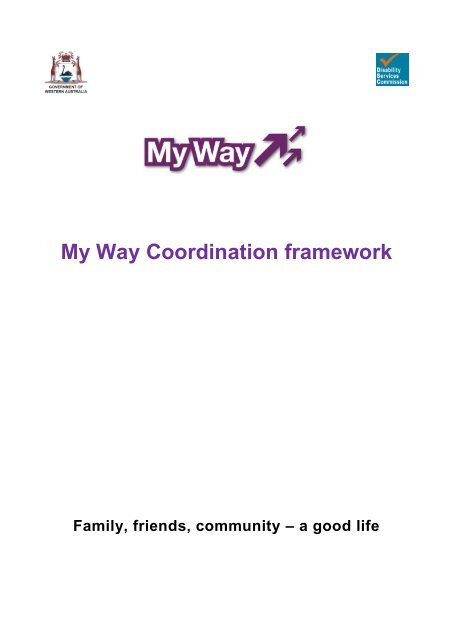
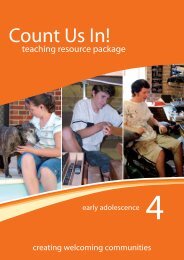
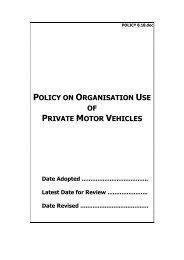
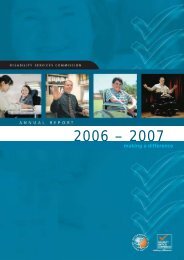

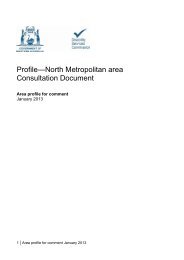
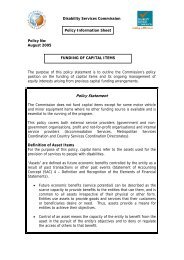
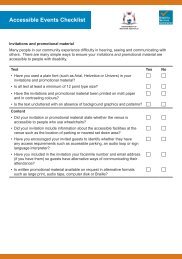
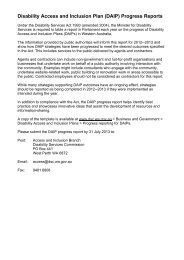
![Heerarka Adeegyada Naafada [PDF 102 kB] - Disability Services ...](https://img.yumpu.com/22096139/1/184x260/heerarka-adeegyada-naafada-pdf-102-kb-disability-services-.jpg?quality=85)
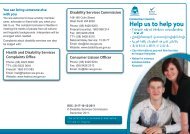
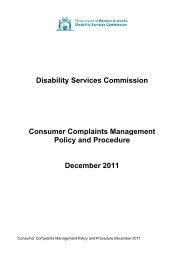
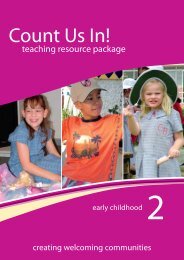
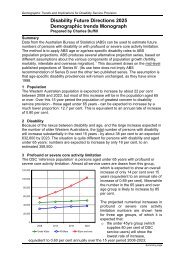
![معايير خدمات الإعاقة [PDF 297 kB] - Disability Services Commission](https://img.yumpu.com/22096120/1/184x260/-pdf-297-kb-disability-services-commission.jpg?quality=85)